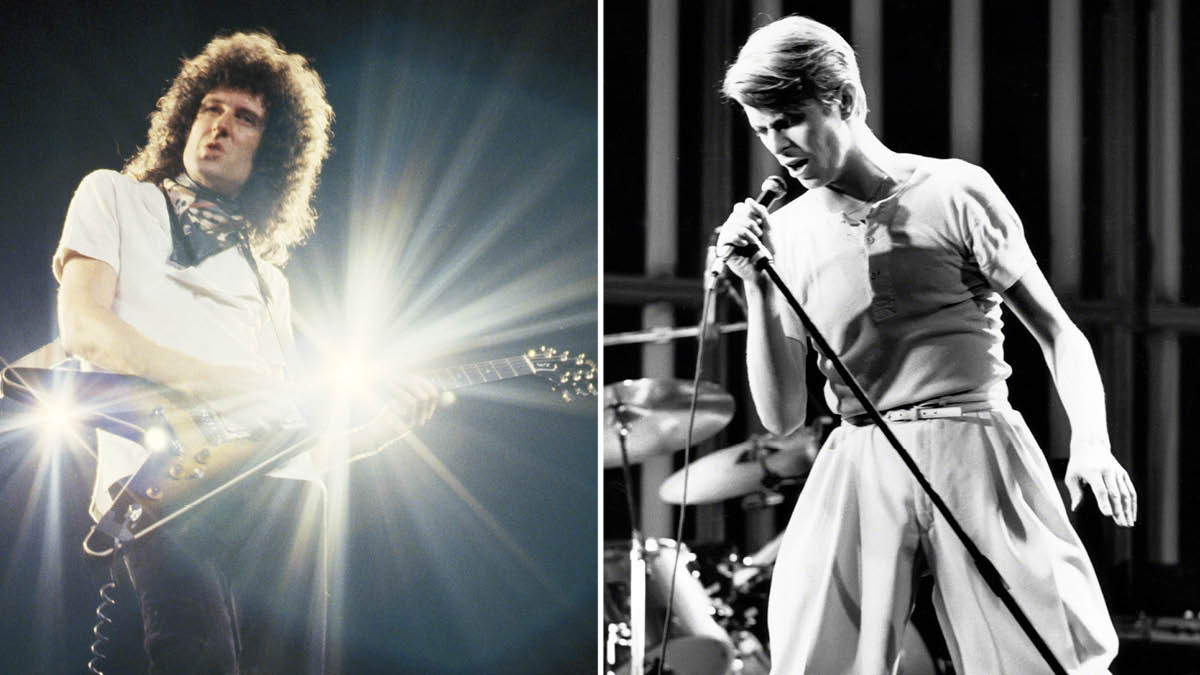“I never liked it, to be honest, the way it was mixed. But I do recognise that it works”: Brian May says Under Pressure sounded like The Who before David Bowie took out the heavy guitar parts
Brian May said he was “beaming” about the guitar on the early versions of Under Pressure. David Bowie was not

Want all the hottest music and gear news, reviews, deals, features and more, direct to your inbox? Sign up here.
You are now subscribed
Your newsletter sign-up was successful
Brian May has revealed that Under Pressure originally sounded like the Who until David Bowie removed all of his heavy electric guitar, much to the Queen guitarist’s disappointment.
In a recent interview with Total Guitar, May looked back on the 1981 collaboration between Queen and Bowie with mixed feelings.
There was no questioning the success of the track. It was a UK number one single. It found two of rock’s greatest vocalists, Freddie Mercury and David Bowie, at the peak of their powers. Its pop-cultural legacy is assured, and it would remain a staple of Queen’s live set.
The problem was that May really liked how the track was shaping up and Bowie didn’t share that vision. The end result was very different to how May imagined it.
“And I was beaming because I liked The Who,” says May. “I remember saying to David, ‘Oh, it sounds like The Who, doesn’t it?’ He says, ‘Yeah, well it’s not going to sound like The Who by the time I’ve finished with it!’ You know, in a joking kind of way. But he didn’t want it to be that way.”
This was a more innocent era. The sessions for Under Pressure began in the best possible way – an after-hours session in the studio following a night out. Nothing helps the digestion better. And May had hit his straps with some big rhythm guitar parts that Pete Townshend would have been proud of.
“It was all done spontaneously in the studio very late at night after we had a meal and a lot of drinks,” said May. “And it was a pretty heavy backing track. When it gets to ‘Why can’t we give love’, we were all working on it together, and it sounded like The Who. It sounded massively chord-driven.”
Want all the hottest music and gear news, reviews, deals, features and more, direct to your inbox? Sign up here.
It was also closer to how Queen would perform it live, with May playing rhythm guitar on electric, but all that remained was acoustic guitar, and the sense of a chance missed.
“Even the main riff, I played that electric, pretty much in the sort of arpeggiated style which I do live now,” says May. “But that never made it into the mix. What they used was the acoustic bits which were done first as a sort of demo.”
But May was not going to pick a fit. Not on this occasion. Sometimes discretion is the better part of valour, and he could see the tension rising before his eyes. A storm was coming in the shape of the “awesome creative forces” of Mercury and Bowie.
“I think it’s probably the only time in my career I bowed out, because I knew it was going to be a fight,” he says. “So basically it was Freddie and David fighting it out in the studio with the mix. And what happened in the mix was that most of that heavy guitar was lost.”
“I never liked it, to be honest, the way it was mixed,” May continued. “But I do recognise that it works. We we play it quite a bit different live… it is a lot heavier and I think it benefits from it.”
You can read the full interview in the latest issue of Total Guitar, available now from Magazines Direct.
Jonathan Horsley has been writing about guitars and guitar culture since 2005, playing them since 1990, and regularly contributes to MusicRadar, Total Guitar and Guitar World. He uses Jazz III nylon picks, 10s during the week, 9s at the weekend, and shamefully still struggles with rhythm figure one of Van Halen’s Panama.

